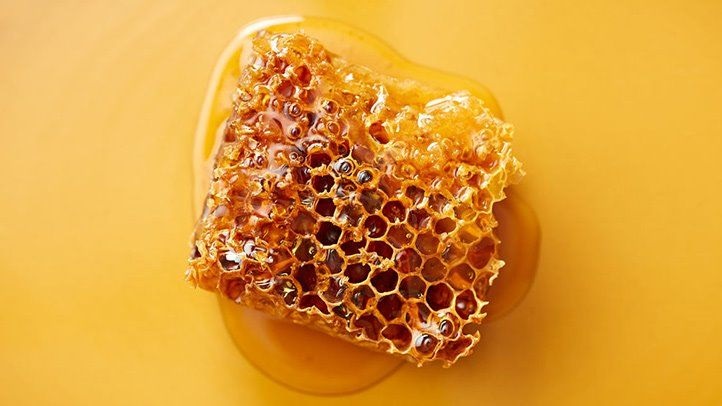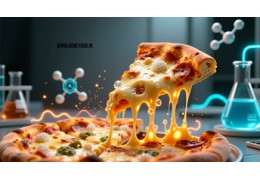Does your mozzarella refuse to stretch or just burn? The secret is science. From "pasta filata" to the crucial role...
Nectar from Heaven for a Healthier Life: Honey and the Secret to Fighting Cancer
Honey: A Heavenly Nectar for Cancer Fighting
Today, the tsunami of cancer has impacted all of human society. You may know someone in your family or circle of friends who has been diagnosed with this devastating disease. Our concern deepens due to unhealthy lifestyles and the rise in carcinogenic risk factors. In a world where chemotherapy and radiation therapy are considered the first line of cancer treatment, the search for natural and low-side-effect remedies continues.
Honey, combined with other natural elements, has been recognized for its therapeutic potential since ancient times. Mixtures of honey with other natural substances like ginger and cinnamon can have remarkable healing effects. In this article, we will scientifically examine the properties of these combinations and their potential application in cancer treatment.
Bridging Modern Science and Ancient Wisdom
In a surprising fusion, modern science and ancient knowledge have unveiled a new secret regarding the therapeutic properties of honey, ginger, cinnamon, and more, for cancer treatment.
Honey: Nature's Gift for Health
Honey is a nectar that bees make from flower nectar, and it has been used for centuries as a natural remedy for many ailments. Scientific research has shown that honey is rich in antioxidants, vitamins, and minerals, which help boost the immune system and fight diseases. But the interesting point is that honey and other natural compounds like ginger, cinnamon, turmeric, and more, have high potential in cancer prevention and treatment.

The Amazing Combinations of Honey and Its Anti-Cancer Properties
Honey, ginger, cinnamon, ginseng, black seed, and more, are valuable treasures of nature that have been used in traditional medicine for centuries to treat various diseases. The bioactive compounds in these natural substances have anti-inflammatory, antimicrobial, and immune-boosting properties. These compounds help maintain health and prevent diseases. Scientific research has also shown that regular consumption of these compounds can reduce the risk of chronic diseases such as heart disease, diabetes, and some types of cancer. But what are these concoctions made of that give them their healing properties? We have summarized these compounds below.
Powerful Antioxidants
Honey, as a natural food, is rich in antioxidant compounds like flavonoids, phenols, and hydrogen peroxide. These compounds protect the body's cells against oxidative damage by neutralizing free radicals. Free radicals are unstable molecules that can damage DNA, proteins, and lipids, thereby accelerating the aging process and some diseases, including cancer. The antioxidants in honey stabilize free radicals by donating electrons, preventing damage to cells. In addition to its anti-cancer properties, honey's antioxidants also have anti-inflammatory and anti-aging properties. The unique combination of antioxidants in honey makes it a valuable food for maintaining health.
Anti-Inflammatory Properties
Honey, beyond being a simple sweetener, is a treasure trove of bioactive compounds that give it a wide range of therapeutic properties, including strong anti-inflammatory effects. These valuable properties are mainly attributed to the phenolic compounds, flavonoids, and hydrogen peroxide it contains.
Phenols are a group of organic compounds known for their potent antioxidant properties. Phenolic acids like caffeic acid and ferulic acid are among the most important phenols in honey. These compounds help reduce inflammation by inhibiting cyclooxygenase (COX) and lipoxygenase (LOX) enzymes, which are responsible for producing prostaglandins and leukotrienes (two types of inflammatory molecules).
Flavonoids are another group of phenolic compounds found in honey. Coumarins, flavones, and isoflavones are among the most important flavonoids in honey. These compounds help reduce inflammation through various mechanisms, including inhibiting free radical production, stabilizing cell membranes, and regulating the expression of inflammatory genes.
Hydrogen peroxide is an oxygen compound that naturally occurs in honey. With its strong antiseptic properties, it prevents the growth of bacteria and fungi and helps reduce inflammation. Additionally, hydrogen peroxide stimulates the body's immune system, aiding in the inflammatory process and repairing damaged tissues.
In addition to these compounds, honey contains significant amounts of vitamins, minerals, and amino acids that synergistically work with phenolic compounds and flavonoids to enhance its anti-inflammatory effects.
Overall, honey's anti-inflammatory properties result from the complex interaction between a wide range of bioactive compounds, each playing a crucial role in reducing inflammation, both independently and in interaction with other compounds.
Strengthening the Immune System
Honey, as a natural food, plays a significant role in strengthening the body's immune system, in addition to its anti-inflammatory properties. The bioactive compounds in honey, such as polyphenols, flavonoids, and antimicrobial peptides, strengthen the immune system through various mechanisms. These compounds help the body effectively fight pathogens by stimulating the activity of macrophages, neutrophils, and natural killer (NK) cells, which are the main cells of the innate immune system. Additionally, honey helps enhance the immune response by increasing the production of interferons and interleukins, which are important cytokines in regulating the immune response. Some types of honey also contain significant amounts of hydrogen peroxide, which has potent antibacterial properties and protects the body against infection. In general, regular consumption of honey can be used as an effective dietary supplement to strengthen the immune system and prevent diseases.
Reducing the Side Effects of Cancer Treatments
Cancer treatments like chemotherapy and radiation therapy, although very effective in destroying cancer cells, often come with unpleasant side effects. In recent years, attention has increased regarding the use of natural compounds to reduce these side effects. The combination of honey with medicinal herbs like ginger, ginseng, black seed, and turmeric, due to their antioxidant, anti-inflammatory, and immune-boosting properties, can play an effective role in reducing the side effects of cancer treatments, such as strengthening the immune system, reducing inflammation, repairing tissues, and improving patients' quality of life. Also, some compounds like hemp can be effective in reducing anxiety and pain caused by treatments.

If you would like to stay healthy and have a memorable experience with natural honey, see our list of honeys. Buy now.
Compounds that Multiply the Power of Honey
Honey is a natural treasure on its own, but when combined with some of the most powerful medicinal herbs, it becomes a potent weapon in the fight against diseases. Compounds like ginger, cinnamon, turmeric, garlic, green tea, and medicinal mushrooms each have amazing therapeutic properties. But when these compounds are combined with honey, a powerful synergy is created that can strengthen the immune system, reduce inflammation, and even fight cancer cells.
Ginger and Cinnamon
The combination of honey, ginger, and cinnamon, as a complementary approach to cancer treatment, has attracted increasing attention due to the unique pharmacological properties of each component. This combination, through various mechanisms including strengthening the immune system, reducing inflammation, improving blood circulation, and protecting healthy cells against oxidative damage, can help reduce the side effects of cancer treatments and improve patients' quality of life.
Ginger: This medicinal herb, with bioactive compounds like gingerol and shogaol, has strong anti-inflammatory, analgesic, and antiemetic properties. Ginger helps reduce inflammation and relieve pain by inhibiting cyclooxygenase (COX) and lipoxygenase (LOX) enzymes, which are responsible for producing prostaglandins and leukotrienes (two types of inflammatory molecules). Also, by improving blood circulation, ginger helps deliver oxygen and nutrients to cells, thereby aiding in the repair of damaged tissues.
Cinnamon: Cinnamon contains phenolic compounds like cinnamaldehyde, which have strong antioxidant properties and protect healthy cells against damage by neutralizing free radicals. Additionally, cinnamon has anti-inflammatory and antibacterial properties that can help reduce inflammation and infection.
Given the valuable position and extraordinary properties of this concoction, we have prepared a separate post with more details for these compounds. To learn more and benefit from this healing concoction, click here.
Turmeric and Curcumin
Curcumin in turmeric is a powerful anti-inflammatory compound that, along with honey, can inhibit the growth of cancer cells.
Garlic and Allicin
Allicin in garlic has strong antibacterial and antiviral properties and, along with honey, can help strengthen the immune system.
Green Tea and Catechin
Catechin in green tea is a potent antioxidant that, along with honey, can protect cells against free radical damage.
Medicinal Mushrooms and Bioactive Compounds
Some medicinal mushrooms, like Ganoderma, contain bioactive compounds that can inhibit tumor growth and help strengthen the immune system.
Combining these natural substances with honey not only adds a pleasant flavor to foods but can also help improve overall health and increase longevity. However, before using any natural supplements, it is best to consult your doctor.
Honey: A Treasure Trove of Therapeutic Properties
Honeys like linden, thyme, astragalus, jujube, and sidr, each with their unique chemical compositions, possess powerful antioxidant and anti-inflammatory properties. Alongside Manuka honey, known for its strong antibacterial properties, these honeys can act as a potent combination in the fight against diseases, especially cancer. Studies suggest that these honeys, by strengthening the immune system and reducing inflammation, serve as a natural supplement alongside medical treatments, helping to improve patients' condition. However, more research is needed to fully substantiate these claims, but the potential of these honeys in cancer treatment is very promising.
Conclusion
Although research in this area is ongoing, the existing evidence indicates that honey and natural compounds can play a significant role in cancer prevention and treatment. However, the use of these compounds should be under medical supervision and as a treatment supplement.
References:
Journal Of Cancer | Nutrition Journal |Advanced Pharmaceutical Bulletin
سوالات پر تکرار
سوالات پر تکرار و پاسخ آنها
پاسخ: عسل به تنهایی درمان قطعی سرطان نیست، اما تحقیقات نشان میدهند که ترکیبات موجود در برخی انواع عسل مانند مانوکا، نمدار، آویشن و گون میتوانند به تقویت سیستم ایمنی بدن و کاهش التهاب کمک کرده و در نتیجه، در درمان سرطان موثر باشند.
عسل مانوکا به دلیل خواص ضدباکتریایی قویاش شناخته شده است. همچنین، عسلهای نمدار، آویشن و گون نیز به دلیل ترکیبات خاص خود، خواص ضدسرطانی دارند.
قبل از مصرف هر نوع مکمل غذایی، از جمله عسل، حتماً با پزشک خود مشورت کنید. برخی افراد ممکن است به عسل آلرژی داشته باشند یا داروهای خاصی مصرف کنند که با مصرف عسل تداخل داشته باشد.
ترکیبات موجود در عسل مانند آنتیاکسیدانها و ترکیبات فنلی میتوانند رشد سلولهای سرطانی را مهار کرده و از آسیب به سلولهای سالم جلوگیری کنند. همچنین، عسل با تقویت سیستم ایمنی بدن، به بدن کمک میکند تا با سلولهای سرطانی مبارزه کند.
خیر، تمام انواع عسل دارای خواص ضدسرطانی یکسان نیستند. برخی عسلها مانند مانوکا به دلیل ترکیبات منحصر به فرد خود، خواص درمانی بیشتری دارند.
خیر، عسل نمیتواند جایگزین درمانهای پزشکی سرطان شود. مصرف عسل باید به عنوان مکمل درمانهای پزشکی و تحت نظر پزشک انجام شود.
بهترین روش مصرف عسل، مصرف روزانه یک تا دو قاشق غذاخوری به صورت ناشتا یا قبل از خواب است. همچنین، میتوانید عسل را به چای، ماست یا سایر غذاها اضافه کنید.
مصرف عسل به طور معمول عوارض جانبی جدی ندارد. با این حال، برخی افراد ممکن است به عسل آلرژی داشته باشند. در صورت مشاهده هرگونه واکنش آلرژیک، مصرف عسل را قطع کرده و به پزشک مراجعه کنید.
به کودکان زیر یک سال نباید عسل داده شود زیرا ممکن است حاوی باکتری بوتولینوم باشد که میتواند باعث بیماری بوتولیسم در نوزادان شود. برای کودکان بالای یک سال، مصرف عسل به مقدار کم و تحت نظر پزشک بلامانع است.

Leave a comment
Log in to post comments
Related posts
 Why does pollen improve your health?
Why does pollen improve your health? 10 Ways to Consume Bee Pollen
10 Ways to Consume Bee Pollen


















Latest comments